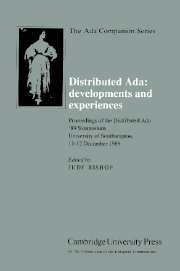 Distributed Ada: Developments and Experiences
Distributed Ada: Developments and Experiences Book contents
- Frontmatter
- Contents
- Preface
- Distributed Ada – the Issues
- Distributed Ada – a Case Study
- Parallel Ada for Symmetrical Multiprocessors
- The York Distributed Ada Project
- From DIADEM to DRAGOON
- Honeywell Distributed Ada – Approach
- Honeywell Distributed Ada – Implementation
- Ada for Tightly Coupled Systems
- A Pragmatic Approach to Distributed Ada for Transputers
- Distributed Ada on Shared Memory Multiprocessors
- The MUMS Multiprocessor Ada Project
- A Portable Common Executable Environment for Ada
- Supporting Reliable Distributed Systems in Ada 9X
Supporting Reliable Distributed Systems in Ada 9X
An Initial Proposal
Published online by Cambridge University Press: 13 October 2009
- Frontmatter
- Contents
- Preface
- Distributed Ada – the Issues
- Distributed Ada – a Case Study
- Parallel Ada for Symmetrical Multiprocessors
- The York Distributed Ada Project
- From DIADEM to DRAGOON
- Honeywell Distributed Ada – Approach
- Honeywell Distributed Ada – Implementation
- Ada for Tightly Coupled Systems
- A Pragmatic Approach to Distributed Ada for Transputers
- Distributed Ada on Shared Memory Multiprocessors
- The MUMS Multiprocessor Ada Project
- A Portable Common Executable Environment for Ada
- Supporting Reliable Distributed Systems in Ada 9X
Summary
ABSTRACT
The Ada programming language was designed to provide support for a wide range of safety-critical applications within a unified language framework, but it is now commonly accepted that the language has failed to achieve all its stated design goals. A major impediment has been the lack of language support for distributed fault-tolerant program execution.
In this paper we propose language changes to Ada which will facilitate the programming of fault-tolerant distributed real-time applications. These changes support partitioning and configuration/reconfiguration. Paradigms are given to illustrate how dynamic reconfiguration of the software can be programmed following notification of processor and network failure, mode changes, software failure, and deadline failure.
INTRODUCTION
There is increasing use of computers that are embedded in some wider engineering application. These systems all have several common characteristics: they must respond to externally generated input stimuli within a finite and specified period; they must be extremely reliable and/or safe; they are often geographically distributed over both a local and a wide area; they may contain a very large and complex software component; they may contain processing elements which are subject to cost/size/weight constraints.
Developing software to control safety-critical applications requires programming abstractions that are unavailable in many of today's programming languages. The Ada programming language was designed to provide support for such applications within a unified language framework, but it is now commonly accepted that the language has failed to achieve all its stated design goals.
- Type
- Chapter
- Information
- Distributed Ada: Developments and ExperiencesProceedings of the Distributed Ada '89 Symposium, University of Southampton, 11–12 December 1989, pp. 292 - 321Publisher: Cambridge University PressPrint publication year: 1990
- 3
- Cited by


